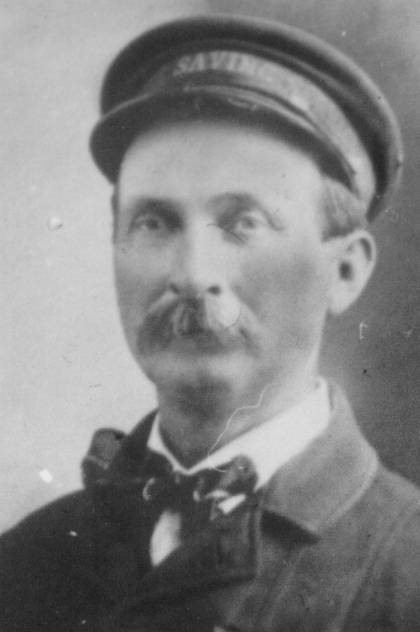 The three-masted barkentine Priscilla left Baltimore on Saturday, the 12th of August 1899, and was towed down Chesapeake Bay as far as the James River channel, where [it] came to anchor. The Priscilla was an American vessel of 643 tons net register, commanded by Captain Benjamin Springsteen, owned in Baltimore, and bound from that port to Rio de Janeiro, Brazil, laden with a general cargo. [The Priscilla] had board 14 persons, 12 of whom comprised the officers and crew, the two others being the captain’s wife, Virginia, and his young son, Elmer, 12 years of age.
The three-masted barkentine Priscilla left Baltimore on Saturday, the 12th of August 1899, and was towed down Chesapeake Bay as far as the James River channel, where [it] came to anchor. The Priscilla was an American vessel of 643 tons net register, commanded by Captain Benjamin Springsteen, owned in Baltimore, and bound from that port to Rio de Janeiro, Brazil, laden with a general cargo. [The Priscilla] had board 14 persons, 12 of whom comprised the officers and crew, the two others being the captain’s wife, Virginia, and his young son, Elmer, 12 years of age.
On Monday morning, August 14th, when [the Priscilla] proceeded to sea, passing out of the Capes of Virginia at 6 a.m., and standing east under all sail, the wind being moderate from west-northwest and hauling to the northward. At noon, Cape Henry bore 30 miles west. At midnight, the breeze was very light, the barometer high, registering 30.20 inches, and the weather was clear. By Tuesday morning, the 15th, the wind had shifted to the northeast and the sky was cloudy, with a light rain falling. These conditions remained unchanged until about midnight, when the breeze hauled east and increased so much that the skysail and jib topsail were taken in.
On the morning of Wednesday, the 16th, the wind was blowing so hard that all the light sails were taken in, and by noonday it was found necessary to furl the spanker and upper topsail. The gale soon became more violent and the foresail was hauled up and furled, the lower topsail clewed up, but blown away, and two reefs put into the mainsail, which was also lost, as well as the main staysail. Then, the captain hove to under bare poles, heading southeast in an east-northeast tempest and rapidly drifting to the south-southwest. He knew, although able to get no observation for 24 hours, that he must be only a little to the northward of Cape Hatteras and he was doing his best “to get clear of it.” Of accomplishing that result, however, he must have entertained little, if any, hope.
Early in the morning of Thursday, the 17th, after a night of distressing anxiety for every soul board, the captain observed that the water was discolored, a fact that showed he had drifted out of the Gulf Stream, and on throwing the lead at 5 o’clock, found that he was in only 30 fathoms of water. At 6 o’clock, the line showed but 25 fathoms and at 8 o’clock only 20. At one-hour intervals, during the day, the soundings varied from 20 to 17 fathoms until 8 o’clock p.m., when but ten fathoms were found. “Then,” said the master, “I did not sound any more I knew that we were going ashore and passed the word forward for all hands to prepare to save themselves.”
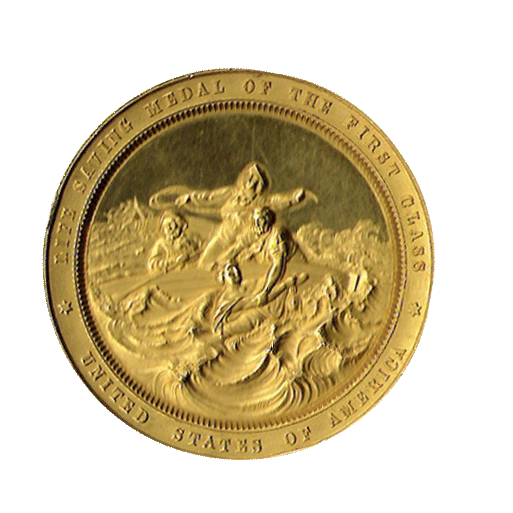 This was very near the time when an observer at the Weather Bureau signal station at Hatteras said the hurricane had a regular velocity of 100 miles an hour. Captain Springsteen said, “It was blowing a hurricane from the northeast, and the seas were running mountain high.” At ten minutes past 9 p.m., the fatal moment had arrived and the vessel struck the bottom. [It] struck lightly at first, and shipped a sea, which smashed the cabin skylights, deluging all below. [It] did not touch again something like 20 minutes, but then [it] struck with an awful shock, and thereafter continued to pound so heavily that the master sent the mate and second mate forward with orders to cut away the port rigging. The three masts instantly went by the board, falling starboard, and the captain then ordered all hands on deck.
This was very near the time when an observer at the Weather Bureau signal station at Hatteras said the hurricane had a regular velocity of 100 miles an hour. Captain Springsteen said, “It was blowing a hurricane from the northeast, and the seas were running mountain high.” At ten minutes past 9 p.m., the fatal moment had arrived and the vessel struck the bottom. [It] struck lightly at first, and shipped a sea, which smashed the cabin skylights, deluging all below. [It] did not touch again something like 20 minutes, but then [it] struck with an awful shock, and thereafter continued to pound so heavily that the master sent the mate and second mate forward with orders to cut away the port rigging. The three masts instantly went by the board, falling starboard, and the captain then ordered all hands on deck.
With crew and passengers mustered on deck, the seas were now breaking over the hull with irresistible fury and, in a few moments, Mrs. Springsteen, William Springsteen, the mate (also the captain’s son) and the ship’s boy, Fitzhugh Lee Goldsborough, were swept overboard, beyond the remotest possibility of aid. The boy Elmer was torn from his father’s arms and, somehow, dashed back into the cabin, which was full of water, where his body was subsequently found.
Fifteen or 20 minutes later, with a loud crash, the hull broke amidships into two parts. Fortunately all hands were congregated on one of these parts, where the stronger might encourage and perhaps assist the weaker or the wounded. This was the after portion, and it held together, pounded and drifted about through a period of almost inconceivable terror lasting more than five hours. At about 4 o’clock in the morning on Friday, the 18th, the hull ceased to rise and fall, and the castaways then knew that they must be close in to the shore; but the weather was so thick, and the seas still continued to beat upon them with such violence that they could not discern the land. Having no means of signaling, they could do no more than cling to their places and occasionally send up a cry of distress.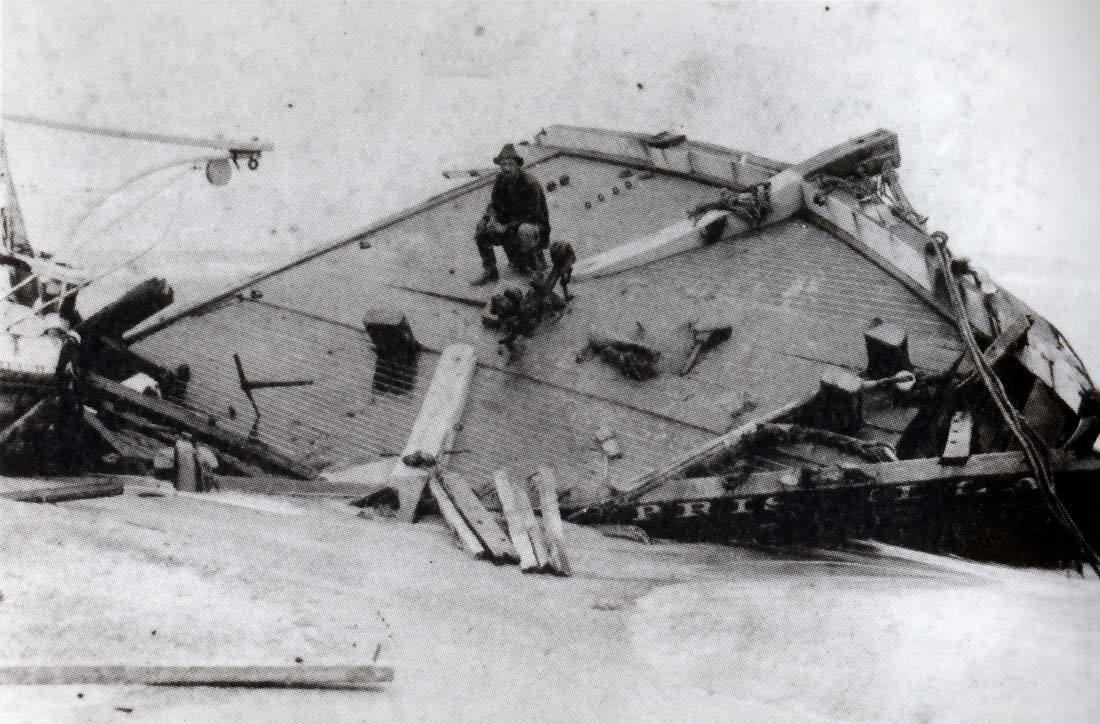
At 3 o’clock, Surfman Rasmus S. Midgett, of the Outer Banks’s Gull Shoal Station, set out on horseback to make the regular south patrol. When he reached a point about three-fourths of a mile from the station, he discovered buckets, barrels, boxes, and other articles coming ashore, which satisfied him that there was a wreck somewhere in the neighborhood. The surf was sweeping clear across the narrow strip of sand that separates the ocean from Pamlico Sound, at times reaching to the saddle girths of his horse. The night was so intensely dark that he could scarcely tell where he was going, but he knew that the patrol must be made at all hazards, and besides, the rapidly multiplying evidences of disaster urged him on.
When Midgett had traveled a little more than two miles farther, he thought he detected the sound of voices and, pausing to listen, caught the outcries of the shipwrecked men. He could see nothing of them or of the wreck, but dismounting and proceeding toward the edge of the bank. He soon made out a part of a vessel, with the forms of several persons crouching upon it, about 100 yards distant.
Here was a dilemma that called for the exercise of sound judgment and faultless courage. Midgett had consumed an hour and a half on his patrol before reaching the place, and to return to the station and bring back the lifesaving crew was to sacrifice three hours more when every moment was precious. On the other hand, to undertake to save the lives of the shipwrecked men without aid was perhaps to throw away his own life, and leave them utterly helpless until another patrol should be attempted, when all might have perished. Short time was spent in deliberation. He determined to do what he could, alone, and without delay.
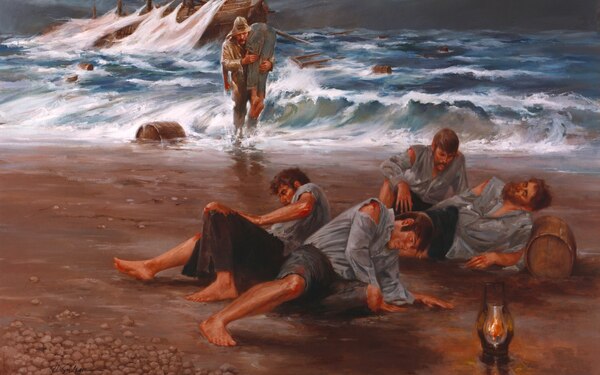 Selecting the first opportunity when a receding wave permitted, Midgett ran down as close to the wreck as he could and shouted instructions for the men to jump overboard, one at a time, as the surf ran back, and that he would take care of them. Then, retreating from the breakers to the higher part of the bank, he watched his chance to approach the wreck again, calling for one man to jump. Obeying h
Selecting the first opportunity when a receding wave permitted, Midgett ran down as close to the wreck as he could and shouted instructions for the men to jump overboard, one at a time, as the surf ran back, and that he would take care of them. Then, retreating from the breakers to the higher part of the bank, he watched his chance to approach the wreck again, calling for one man to jump. Obeying h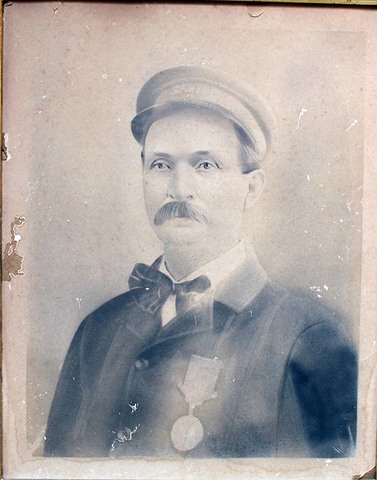 is instructions, a sailor would leap overboard and Midgett, in each instance, would seize him and drag him from the pursuing waves safe to bank. In this manner, being compelled to venture closer and more into danger, he rescued seven men.
is instructions, a sailor would leap overboard and Midgett, in each instance, would seize him and drag him from the pursuing waves safe to bank. In this manner, being compelled to venture closer and more into danger, he rescued seven men.
During all these laborious exertions, he incurred much danger from the likely chance that on each occasion he and his burden might be caught by the breakers and swept out to sea. But now came far greater demands upon his courage and physical powers. There still remained upon the vessel three men so bruised and exhausted that they were unable to do as the others had done, but Midgett was not dismayed. To save these men, he must go right down into the sea close to the wreck, take them off, and carry them bodily to the beach. Down the steep bank into the very jaws of death three times he descended, and each time dragged away a helpless man and bore him up out of the angry waters to a place of safety. Ten lives saved were the priceless trophies of his valor. Seven of the men were still able to walk, and these he sent forward toward the station while the other three he took to a safe place, and after giving his own coat to Captain Springsteen, he rode on to summon the aid of his comrades.
Gull Shoal Station’s keeper was on the beach when Midgett hove in sight and, upon hearing Midgett’s amazing story, ordered two of the surfmen to harness horses to their carts and proceed to bring up the disabled men. The other surfmen he directed to set up a stove in the sitting room and make a variety of thoughtful preparations for the welcome of the castaways. Imagination could hardly picture a more wretched company. When the vessel first encountered the breakers, they were all sound men, well clad, with their clothing securely fastened about them; however, the terrible buffeting they had sustained had stripped them almost naked, and their bodies were bruised, bleeding, and swollen. The sorriest case among them was that of Captain Springsteen, who had received a ragged wound in the breast inflicted by the almost deadly thrust of a rough piece of wreckage.
As the poor fellows hobbled or were kindly borne within the hospitable walls of the station, the surfmen quickly took them in hand. They stripped off the victims’ apparel, washed their bodies, gently dressed their wounds, clothed them in dry undergarments, and placed them quietly in comfortable beds. It was the end of a splendid day’s work, well worth the admiration of the whole people, whose brave and single-hearted servants of humanity had performed it. Midgett, who bore the noblest part, was subsequently awarded a Gold Life Saving Medal of honor by the Secretary the Treasury, who transmitted with it a highly commendatory letter reciting the story of the brave man’s heroism.